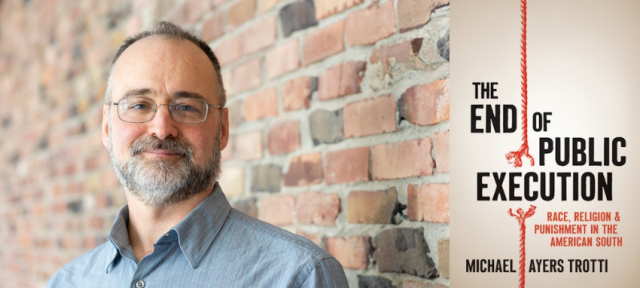Historian Michael Trotti 83F Explores the History of Public Executions and Racism in New Book

Trotti’s latest book examines the extreme and overtly racist history of legal executions in the United States and tells the story of how capital punishment in the American South moved from public spaces to behind closed doors.
Before 1850, all legal executions in the South were performed before crowds that could number in the thousands; the last legal public execution was in 1936. The End of Public Execution: Race, Religion and Punishment in the American South focuses on the shift of capital punishment being carried out behind barriers, exploring that change along with our understanding of lynching and competing visions of justice and religion. Trotti, who is also a professor of history at Ithaca College, takes on issues of mortality, race, and class, shedding light on the change in societal attitudes toward public execution.
The book is a culmination of Trotti's extensive research and study of the social, cultural, and political aspects surrounding legal executions in the southern U.S. in the late 19th and early 20th centuries. In an era of extreme racism, most of those executed were Black, and, after the Civil War, public executions became something white governments did not want: Black men, their ministers, and huge mixed-race “congregations” celebrating the confessed sinner “returning to the Lord.”
At the book’s launch party earlier this year, Trotti discussed his approach to this subject and how it changed as his research deepened. “In truth most of the questions I started with I ended up abandoning,” he said. “That is to say, I thought this was going to be a much more quantitative study than it ended up being. I thought this was going to be showing how lynching and public executions were working alongside of each other, whereas what I ended up finding was that they’re really different experiences.”
Trotti studied history while at Hampshire and, for his Div I project, he examined the impact of the Colonies on the Cherokee. “It was my first large-scale historical research paper and it was on the U.S. South, the area I’ve continued to work on throughout my career,” he recalled. “My four semesters at Hampshire were really formative for me, mostly in the general way of thinking creatively about problems and learning the skills of research and writing.”
The End of Public Execution has been described by author Jeffrey S. Adler as “a timely contribution to African American, southern, religious, and criminal justice history” and “an essential read for a wide audience of scholars” by the writer Randolph Roth.
Trotti is also the author of The Body in the Reservoir: Murder and Sensationalism in the South.



